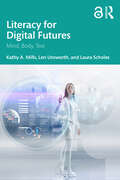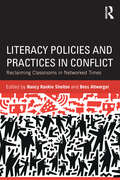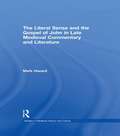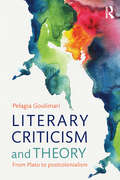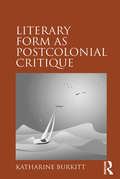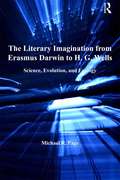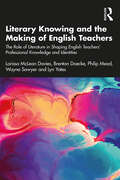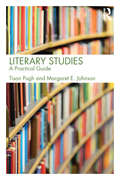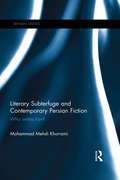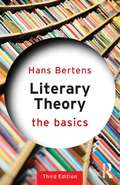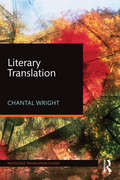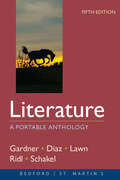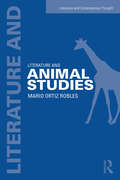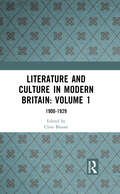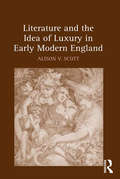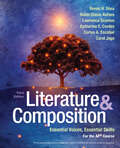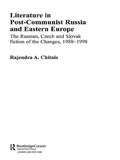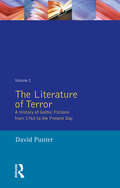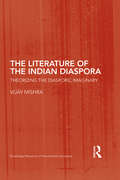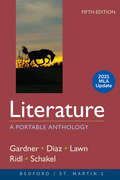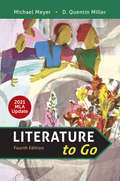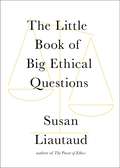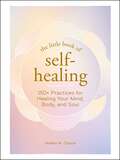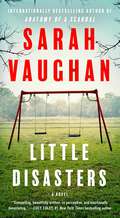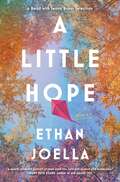Special Collections
Benetech’s Global Certified Accessible Titles
Description: Benetech’s GCA program is the first independent third-party EPUB certification to verify ebook accessibility. By creating content that is born accessible, publishers can meet the needs of all readers. Learn more: https://bornaccessible.benetech.org/
- Table View
- List View
Literacy for Digital Futures
by Kathy A. Mills and Len Unsworth and Laura ScholesThe unprecedented rate of global, technological, and societal change calls for a radical, new understanding of literacy. This book offers a nuanced framework for making sense of literacy by addressing knowledge as contextualised, embodied, multimodal, and digitally mediated. In today’s world of technological breakthroughs, social shifts, and rapid changes to the educational landscape, literacy can no longer be understood through established curriculum and static text structures. To prepare teachers, scholars, and researchers for the digital future, the book is organised around three themes – Mind and Materiality; Body and Senses; and Texts and Digital Semiotics – to shape readers’ understanding of literacy. Opening up new interdisciplinary themes, Mills, Unsworth, and Scholes confront emerging issues for next-generation digital literacy practices. The volume helps new and established researchers rethink dynamic changes in the materiality of texts and their implications for the mind and body, and features recommendations for educational and professional practice.
Literacy Policies and Practices in Conflict
by Nancy Rankie Shelton and Bess AltwergerCurrent U.S. school reform efforts link school success, student achievement, and teacher performance to standardized tests and narrowly prescribed curricula. How do test-driven, mandated curricula in urban school systems overtly and subtly impact teachers’ efforts to provide technologically advanced, challenging classroom environments that foster literacy development for all students? How do these federal policies affect instruction at the classroom level? The premise of this book is that, in order for teachers to confront and/or counteract the pressures placed on them from these policies, it is necessary to first understand them. This book takes a close look at the tensions that exist between federal mandates and contemporary literacy needs and how those tensions impact classroom practices. Providing a clear sociopolitical overview and analysis, it combines theoretical explanations with examples from current ethnographic research. Readers are challenged to (re)consider whether meeting test performance benchmarks should be the hallmark of school success when the goal of test performance supersedes the goal of producing highly literate, productive citizens of the future.
The Literal Sense and the Gospel of John in Late Medieval Commentary and Literature
by MArk HazardFirst Published in 2003. Routledge is an imprint of Taylor & Francis, an informa company.
Literary Criticism and Theory
by Pelagia GoulimariThis incredibly useful volume offers an introduction to the history of literary criticism and theory from ancient Greece to the present. Grounded in the close reading of landmark theoretical texts, while seeking to encourage the reader's critical response, Pelagia Goulimari examines: major thinkers and critics from Plato and Aristotle to Foucault, Derrida, Kristeva, Said and Butler; key concepts, themes and schools in the history of literary theory: mimesis, inspiration, reason and emotion, the self, the relation of literature to history, society, culture and ethics, feminism, poststructuralism, postcolonialism, queer theory; genres and movements in literary history: epic, tragedy, comedy, the novel; Romanticism, realism, modernism and postmodernism. Historical connections between theorists and theories are traced and the book is generously cross-referenced. With useful features such as key-point conclusions, further reading sections, descriptive text boxes, detailed headings, and with a comprehensive index, this book is the ideal introduction to anyone approaching literary theory for the first time or unfamiliar with the scope of its history.
Literary Form as Postcolonial Critique
by Katharine BurkittFocusing on works by Derek Walcott, Les Murray, Anne Carson, and Bernardine Evaristo, Katharine Burkitt investigates the relationship between literary form and textual politics in postcolonial narrative poems and verse-novels. Burkitt argues that these works disrupt and undermine the traditions of particular forms and genres, and most notably the expectations attached to the prose novel, poetry, and epic. This subversion of form, Burkitt argues, is an important aspect of the texts' postcoloniality as they locate themselves critically in relation to literary convention, and they are all concerned with matters of social, racial, and national identities in a world where these categories are inherently complicated. In addition, the awareness of epic tradition in these texts unites them as 'post-epics', in that as they reuse the myths and motifs of a variety of epics, they question the status of the form, demonstrate it to be inherently malleable, and regenerate its stories for the contemporary world. As she examines the ways in which postcolonial texts rewrite the traditions of classical epics for the twentieth and twenty-first centuries, Burkitt ties close textual analysis to a critical intervention in the politics of form.
The Literary Imagination from Erasmus Darwin to H.G. Wells
by Michael R. PageAt the close of the eighteenth century, Erasmus Darwin declared that he would 'enlist the imagination under the banner of science,' beginning, Michael Page argues, a literary narrative on questions of evolution, ecology, and technological progress that would extend from the Romantic through the Victorian periods. Examining the interchange between emerging scientific ideas-specifically evolution and ecology-new technologies, and literature in nineteenth-century Britain, Page shows how British writers from Darwin to H.G. Wells confronted the burgeoning expansion of scientific knowledge that was radically redefining human understanding and experience of the natural world, of human species, and of the self. The wide range of authors covered in Page's ambitious study permits him to explore an impressive array of topics that include the role of the Romantic era in the molding of scientific and cultural perspectives; the engagement of William Wordsworth and Percy Shelley with questions raised by contemporary science; Mary Shelley's conflicted views on the unfolding prospects of modernity; and how Victorian writers like Charles Kingsley, Samuel Butler, and W.H. Hudson responded to the implications of evolutionary theory. Page concludes with the scientific romances of H.G. Wells, to demonstrate how evolutionary fantasies reached the pinnacle of synthesis between evolutionary science and the imagination at the close of the century.
Literary Knowing and the Making of English Teachers
by Brenton Doecke and Lyn Yates and Philip Mead and Wayne Sawyer and Larissa McLean DaviesAt a time when knowledge is being 're-valued' as central to curriculum concerns, subject English is being called to account. Literary Knowing and the Making of English Teachers puts long-standing debates about knowledge and knowing in English in dialogue with an investigation of how English teachers are made in the 21st century. This book explores, for the first time, the role of literature in shaping English teachers’ professional knowledge and identities by examining the impacts, in particular, of their own school teaching in their ‘making’. The voices of early career English teachers feature throughout the work, in a series of vignettes providing reflective accounts of their professional learning. The authors bring a range of disciplinary expertise and standpoints to explore the complexity of knowledge and knowing in English. They ask: How do English teachers negotiate competing curriculum demands? How do they understand literary knowledge in a neoliberal context? What is core English knowledge for students, and what role should literature play in the contemporary curriculum? Drawing on a major longitudinal research project, they bring to light what English teachers see as central to their work, the ways they connect teaching with their disciplinary training, and how their understandings of literary practice are contested and reimagined in the classroom. This innovative work is essential reading for scholars and postgraduate students in the fields of teacher education, English education, literary studies and curriculum studies.
Literary Studies
by Tison Pugh and Margaret E. JohnsonLiterary Studies: A Practical Guide provides a comprehensive foundation for the study of English, American, and world literatures, giving students the critical skills they need to best develop and apply their knowledge. Designed for use in a range of literature courses, it begins by outlining the history of literary movements, enabling students to contextualize a given work within its cultural and historical moment. Specific focus is then given to the use of literary theory and the analysis of: Poetry Prose fiction and novels Plays Films. A detailed unit provides clear and concise introductions to literary criticism and theory, encouraging students to nurture their unique insights into a range of texts with these critical tools. Finally, students are guided through the process of generating ideas for essays, considering the role of secondary criticism in their writing, and formulating literary arguments. This practical volume is an invaluable resource for students, providing them with the tools to succeed in any English course.
Literary Subterfuge and Contemporary Persian Fiction
by Mohammad Mehdi KhorramiThe main focus of Literary Subterfuge and Contemporary Persian Fiction is to identify components and elements which define Persian modernist fiction, placing an emphasis on literary concepts and devices which provide the dynamics of the evolutionary trajectory of this modernism. The question of ‘who writes Iran’ refers to a contested area which goes beyond the discipline of literary criticism. Non-literary discourses have made every effort to impose their "committed" readings on literary texts; they have even managed to exert influence on the process of literary creation. In this process, inevitably, many works, or segments of them, and many concepts which do not lend themselves to such readings have been ignored; at the same time, many of them have been appropriated by these discourses. Yet components and elements of Persian literary tradition have persistently engaged in this discursive confrontation, mainly by insisting on literature’s relative autonomy, so that at least concepts such as conformity and subterfuge, essential in terms of defining modern and modernist Persian fiction, could be defined in a literary manner. Proffering an alternative in terms of literary historiography; this book supports a methodological approach that considers literary narratives which occur in the margins of dominant discourses, and indeed promote non-discursivity, as the main writers of Persian modernist fiction. It is an essential resource for scholars and researchers interested in Persian and comparative literature, as well as Middle Eastern Studies more broadly.
Literary Theory
by Hans BertensThis third edition of Hans Bertens' bestselling book is an essential guide to the often confusing and complicated world of literary theory. Exploring a broad range of topics from Marxist and feminist criticism to postmodernism and new historicism Literary Theory: The Basics covers contemporary topics including: reception theory and reader response theory the new criticism of postmodernism the 'after theory' debate post-humanism, biopolitics and animal studies aesthetics Literary Theory: The Basics helps readers to approach the many theories and debates in this field with confidence. Now with updated case studies and further reading this is an essential purchase for anyone who strives to understand literary theory today.
Literary Translation
by Chantal WrightRoutledge Translation Guides cover the key translation text types and genres and equip translators and students of translation with the skills needed to translate them. Concise, accessible and written by leading authorities, they include examples from existing translations, activities, further reading suggestions and a glossary of key terms. Literary Translation introduces students to the components of the discipline and models the practice. Three concise chapters help to familiarize students with: what motivates the act of translation how to read and critique literary translations how to read for translation. A range of sustained case studies, both from existing sources and the author’s own research, are provided along with a selection of relevant tasks and activities and a detailed glossary. The book is also complemented by a feature entitled ‘How to get started in literary translation’ on the Routledge Translation Studies Portal (http://cw.routledge.com/textbooks/translationstudies/). Literary Translation is an essential guidebook for all students of literary translation within advanced undergraduate and postgraduate/graduate programmes in translation studies, comparative literature and modern languages.
Literature
by Jack Ridl and Peter Schakel and Janet E. Gardner and Beverly Lawn and Joanne DiazLiterature: A Portable Anthology features nearly 250 literary selections with thorough coverage of reading and writing about literature, all at an affordable price.
Literature and Animal Studies
by Mario Ortiz-RoblesWhy do animals talk in literature? In this provocative book, Mario Ortiz Robles tracks the presence of animals across an expansive literary archive to argue that literature cannot be understood as a human endeavor apart from its capacity to represent animals. Focusing on the literary representation of familiar animals, including horses, dogs, cats, and songbirds, Ortiz Robles examines the various tropes literature has historically employed to give meaning to our fraught relations with other animals. Beyond allowing us to imagine the lives of non-humans, literature can make a lasting contribution to Animal Studies, an emerging discipline within the humanities, by showing us that there is something fictional about our relation to animals. Literature and Animal Studies combines a broad mapping of literary animals with detailed readings of key animal texts to offer a new way of organizing literary history that emphasizes genera over genres and a new way of classifying animals that is premised on tropes rather than taxa. The book makes us see animals and our relation to them with fresh eyes and, in doing so, prompts us to review the role of literature in a culture that considers it an endangered art form.
Literature and Culture in Modern Britain
by Clive BloomThe first in a three-volume sequence, this book covers the period between 1900 and 1929, providing a perceptive and thorough analysis of British literature within its historical, cultural and artistic context. It identifies the crucial, interwoven relationships between literature and the visual arts, modern poetry, popular fiction, journalism, cinema, music and radio. Much factual detail and a literary chronology guide the reader through the text.
Literature and the Idea of Luxury in Early Modern England
by Alison V. ScottExploring the idea of luxury in relation to a series of neighboring but distinct concepts including avarice, excess, licentiousness, indulgence, vitality, abundance, and waste, this study combines intellectual and cultural historical methods to trace discontinuities in luxury’s conceptual development in seventeenth-century England. The central argument is that, as ’luxury’ was gradually Englished in seventeenth-century culture, it developed political and aesthetic meanings that connect with eighteenth-century debates even as they oppose their so-called demoralizing thrust. Alison Scott closely examines the meanings of luxury in early modern English culture through literary and rhetorical uses of the idea. She argues that, while ’luxury’ could and often did denote merely ’lust’ or ’licentiousness’ as it tends to be glossed by modern editors of contemporary works, its cultural lexicon was in fact more complex and fluid than that at this time. Moreover, that fuller understanding of its plural and shifting meanings-as they are examined here-has implications for the current intellectual history of the idea in Western thought. The existing narrative of luxury’s conceptual development is one of progressive upward transformation, beginning with the rise of economic liberalism amidst eighteenth-century debates; it is one that assumes essential continuity between the medieval treatment of luxury as the sin of ’luxuria’ and early modern notions of the idea even as social practises of luxury explode in early seventeenth-century culture.
Literature & Composition
by Lawrence Scanlon and Robin Dissin Aufses and Carol Jago and Renee H. Shea and Katherine E. Cordes and Carlos EscobarSince its first edition, Literature & Composition was designed specifically for the AP® English Literature course. Its unique structure of skill-building opening chapters combined with an engaging thematic anthology provides the flexibility you need to plan your year and differentiate based on your students’ needs. In this edition, the book you know and love now fully aligns to the new AP® Course and Exam Description.
Literature in Post-Communist Russia and Eastern Europe
by Rajendra Anand ChitnisThis book considers Russian, Czech and Slovak fiction in the late communist and early post-communist periods. It focuses on the most innovative trend to emerge in this period, on those writers who, during and after the collapse of communism, characterised themselves as 'liberators' of literature. It shows how these writers in their fiction and critical work reacted against the politicisation of literature by Marxist-Leninist and dissident ideologues, rejecting the conventional perception of literature as moral teacher, and redefining the nature and purpose of writing. The book demonstrates how this quest, enacted in the works of these writers, served for many critics and readers as a metaphor for the wider disorientation and crisis precipitated by the collapse of communism.
The Literature of Terror
by David PunterThe Literature of Terror: the Modern Gothic is the second volume in David Punter's impressive survey of gothic writing covering over two centuries. This long awaited second edition has been expanded to take into account the latest critical research, and is now published in two volumes. Volume One covers the period from 1765 to the Edwardian age while Volume Two discusses modern gothic, starting with the 'decadent' gothic writing of Oscar Wilde and continuing through the twentieth century.
The Literature of the Indian Diaspora
by Vijay MishraThe Literature of the Indian Diaspora constitutes a major study of the literature and other cultural texts of the Indian diaspora. It is also an important contribution to diaspora theory in general. Examining both the ‘old’ Indian diaspora of early capitalism, following the abolition of slavery, and the ‘new’ diaspora linked to movements of late capital, Mishra argues that a full understanding of the Indian diaspora can only be achieved if attention is paid to the particular locations of both the ‘old’ and the ‘new’ in nation states. Applying a theoretical framework based on trauma, mourning/impossible mourning, spectres, identity, travel, translation, and recognition, Mishra uses the term ‘imaginary’ to refer to any ethnic enclave in a nation-state that defines itself, consciously or unconsciously, as a group in displacement. He examines the works of key writers, many now based across the globe in Canada, Australia, America and the UK, – V.S. Naipaul, Salman Rushdie, M.G. Vassanji, Shani Mootoo, Bharati Mukherjee, David Dabydeen, Rohinton Mistry and Hanif Kureishi, among them – to show how they exemplify both the diasporic imaginary and the respective traumas of the ‘old’ and ‘new’ Indian diasporas.
Literature: A Portable Anthology
by Jack Ridl and Peter Schakel and Janet E. Gardner and Beverly Lawn and Joanne DiazLiterature: A Portable Anthology features nearly 250 literary selections with thorough coverage of reading and writing about literature, all at an affordable price.
Literature to Go with 2021 MLA Update
by Michael Meyer and D. Quentin MillerThis ebook has been updated to provide you with the latest guidance on documenting sources in MLA style and follows the guidelines set forth in the MLA Handbook, 9th edition (April 2021).Drawn from our best-selling anthology The Compact Bedford Introduction to Literature, Literature to Go is a brief and inexpensive collection of stories, poems, and plays accompanied by thorough critical reading and writing support.
The Little Book of Big Ethical Questions
by Susan LiautaudPerfect for your next dinner party discussion, The Little Book of Big Ethical Questions presents some of today&’s most thought-provoking ethical questions in a welcoming, easy-to-discuss Q&A format, with guidance from a renowned ethicist.Often a single question can spark a meaningful exchange—like &“Would you apply for a job you know your friend is applying for?&” Or &“Should voting be mandatory?&” Or what about police using facial recognition technology? Questions like these spur us to consider: What would I have done? Is there one correct answer? And ultimately: How can ethics help us navigate these situations to find the best outcome for ourselves and others? An ethicist who advises leaders and organizations worldwide, Susan Liautaud asks intriguing questions that encourage lively discussion across a range of subjects, from family and friends to health and technology to politics, work, and consumer choices. She then walks through the ways you might approach each situation to find the best answer for you. Grab the book, gather a few friends, and dive in!
The Little Book of Self-Healing
by Nneka M. OkonaFind health, wellness, comfort, and recovery with these 200 self-healing techniques designed to nourish the mind, body, and spirit.Self-healing helps you tune into the needs of your mind, body, and spirit to fully understand what you need for optimal health and wellness. With The Little Book of Self-Healing, you&’ll find 200 practices that will help you learn to recognize the signs your body gives you, achieve the right balance for your mental and physical needs, and feel empowered as you take an active role in your healing. Whether you&’re dealing with the symptoms of extreme stress, coping with traumatic experience, or simply looking to develop a deeper connection with yourself, this book has the tools you need including: -Letting go of the hustle mentality -Finding movement activities that resonate with you -Creating a community of supportive friends -And more! While modern medicine and simple self-care can still be an important part of your health routine, these simple self-healing techniques—taking a bath, meditating, or decluttering—can take your wellness to the next level. Learn how to truly care for yourself and feel your best every day.
Little Disasters
by Sarah Vaughan&“Taut, clever, compelling, and guaranteed to keep you on the edge of your seat.&”—Paula Hawkins, #1 New York Times bestselling author of The Girl on the Train and Into the Water From the bestselling author of Anatomy of a Scandal—a new thought-provoking novel exploring the complexity of motherhood and all that connects and disconnects us.You think you know her…but look a little closer. She is a stay-at-home mother-of-three with boundless reserves of patience, energy, and love. After being friends for a decade, this is how Liz sees Jess. Then one moment changes everything. Dark thoughts and carefully guarded secrets surface—and Liz is left questioning everything she thought she knew about her friend, and about herself. The truth can&’t come soon enough. With Sarah Vaughan&’s signature &“clever and compelling&” (Claire Douglas, author of Last Seen Alive) prose, Little Disasters is a tightly-wound and evocative page-turner that will haunt you long after you finish the last page.
A Little Hope
by Ethan JoellaA Read with Jenna Bonus Selection An &“immersive…illuminating&” (Booklist) and life-affirming novel following the residents of an idyllic Connecticut town over the course of a year, A Little Hope explores the intertwining lives of a dozen neighbors as they confront everyday desires and fears: a lost love, a stalled career, an illness, and a betrayal.Freddie and Greg Tyler seem to have it all: a comfortable home, a beautiful young daughter, a bond that feels unbreakable. But when Greg is diagnosed with a rare and aggressive form of cancer, the sense of certainty they once knew evaporates. Throughout their town, friends and neighbors face the most difficult of life&’s challenges and are figuring out how to survive thanks to love, grace, and hope. &“A quietly powerful portrait of small-town life…told with wisdom and tenderness&” (Mary Beth Keane, author of Ask Again, Yes) A Little Hope is a deeply resonant debut that immerses the reader in a community and celebrates the importance of small moments of connection.
